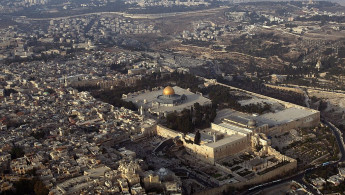Palestinians in Jerusalem brace for ultranationalist Israeli 'flag march'
Jerusalem is bracing for an ultranationalist "flag march" by Israelis on Sunday that has sparked warnings of a new escalation from Palestinian factions.
The "March of the Flags" comes as Israel marks "Jerusalem Day", commemorating its seizing of occupied East Jerusalem after it captured it in 1967. Tel Aviv went on to illegally annex the area, recognised by the UN as Palestinian territory, in 1980.
Some 3,000 Israeli police officers are to be deployed ahead of the march, which is due to begin at 4:00 pm (1300 GMT) and is considered a blatant provocation and violation by Palestinians.
After Israeli security violence at Al-Aqsa Mosque, the third-holiest site in Islam, and efforts to expel Palestinians from East Jerusalem's Sheikh Jarrah neighbourhood, Hamas fired rockets at Israel at the start of last year's Jerusalem Day march.
Israel then launched a deadly 11-day bombing campaign, killing over 250 Palestinians, including 66 children, while 14 people in Israel, including one child, were killed by rockets launched by Hamas and other Palestinian militants.
Hamas, the Palestinian Islamist movement that rules the besieged Gaza Strip, warned last week against the march passing through the Al-Aqsa compound, saying it would use "all possibilities" to confront them.
Israeli marchers are expected to enter the Old City via Damascus Gate, heavily used by Palestinians, before making their way to the Western Wall.
The Old City has been less impacted by illegal Israeli settlement activity than other areas of the city and has held on to its Palestinian character.
Israeli authorities have not approved requests to enter the Al-Aqsa compound.
The path of the flag march has never included Al-Aqsa, which is located within the Old City, but Israeli security and settlers repeatedly and violently raided the complex during the Muslim holy month of Ramadan, which ran from 1 April to 1 May.
Jews are allowed to visit the Al-Aqsa Mosque compound at specific times but are not permitted to pray there under the terms of a longstanding historic and legal status quo agreement.
On the eve of the march, Hamas called on Palestinians to gather at Al-Aqsa to "thwart the occupation's Judaisation schemes".
"We will not hesitate to use all means to stop the incursion of our holy places, and Israel will pay a big price," Ghazi Hamad, a member of the Islamist group's political bureau, told AFP.
'Calculated policy'
Israeli Prime Minister Naftali Bennett has nonetheless confirmed the march would "take place according to the planned route, as it has for decades".
The march has been described by leading Israeli daily Yediot Aharonot as a "personal test" for Bennett, marking a departure in strategy compared with that of his predecessor Benjamin Netanyahu.
Whereas Netanyahu chose what the newspaper claimed was a "noisy policy of capitulation" that ended with Hamas firing rockets at Israel, Bennett was adopting a "calm and calculated policy", Yediot Aharonot said.
According to security analyst Shlomo Mofaz, Bennett was betting on the likelihood that "Hamas does not have any interest in another war".
Each year, thousands of Israeli nationalists participate in a controversial Flag March, waving Israeli flags, singing nationalist songs, and in some cases, chanting anti-Arab slogans, as they pass through Palestinian neighbourhoods https://t.co/43d3NJKuUZ
— The New Arab (@The_NewArab) May 26, 2022
"The main policy of Hamas today is to encourage people inside Israel [to attack], while they continue to reconstruct the Gaza Strip," added the former intelligence officer.
But there is another factor at play – Iran, Israel's arch-nemesis and a supporter of armed factions in Gaza.
According to The New York Times, Israel has informed the United States that it was responsible for an attack in which Iranian Revolutionary Guards colonel Sayyad Khodai was gunned down in Tehran last week.
As a result, Mofaz said, Iran may "encourage" Palestinian armed factions to launch rockets at Israel.
The United Nations envoy for Middle East peace, Tor Wennesland, on Friday appealed to "all sides to exercise maximum restraint… to avoid another violent conflict that will only claim more lives".
"The message of the international community is clear; to avoid such an escalation," he said.
(AFP, Reuters)





 Follow the Middle East's top stories in English at The New Arab on Google News
Follow the Middle East's top stories in English at The New Arab on Google News
![Netanyahu furiously denounced the ICC [Getty]](/sites/default/files/styles/image_330x185/public/2024-11/GettyImages-2169352575.jpg?h=199d8c1f&itok=-vRiruf5)
![Both Hamas and the Palestinian Authority welcomed the ICC arrest warrants [Getty]](/sites/default/files/styles/image_330x185/public/2024-11/GettyImages-2178351173.jpg?h=199d8c1f&itok=TV858iVg)
